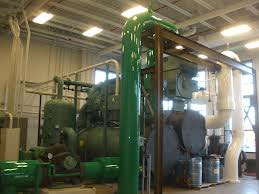Chevy is rolling out an innovative program that offers US colleges and universities the opportunity to earn money when they increase their investment in energy efficiency and renewable energy on campus.
The "Chevrolet Campus Clean Energy Campaign" is already buying renewable energy credits (RECs) from top performing schools when they make such upgrades.
Chevy says their objective is simple: to "strengthen the clean energy systems across the country that we want to be powering electric vehicles like our Volt and Spark EV while retiring carbon credits to benefit the climate."
Instead of selling the credits on the open market (where other organizations can buy them to continue polluting), Chevy will retire them to reduce US carbon emissions.
Buying RECs from universities will give them 5-25% of the money they need to cover upfront costs that may stand in the way of more aggressively converting to clean energy or upgrading buildings.
Campus carbon reductions are evaluated based on campus-wide performance or based on individual LEED-certified buildings.
"Historically, campuses purchased other organizations’ carbon credits to help achieve carbon neutrality," says Eban Goodstein, director of Bard College’s Center for Environmental Policy. "Now they are earning revenues for the carbon reductions achieved right on their own sites, where the long-term clean energy benefits lie for their community."
As you likely know, when an organization – be it a corporation or university – sets a goal to reduce carbon emissions, they often do it partially by deploying projects on the ground and the remainder by buying RECs.
To develop the program, Chevy worked with an advisory team led by the Climate Neutral Business Network with support from the Bonneville Environmental Foundation, the U.S. Green Building Council and the Association for the Advancement of Sustainability in Higher Education. The method for measuring carbon reduction from projects is approved by the Verified Carbon Standard.
Indiana’s Ball State University is among the first to work with Chevy in converting from coal to the nation’s biggest geothermal system:

"Financing made available through Chevrolet can seed the creation of green revolving loan funds at colleges and universities … which fund additional conservation and energy use reductions. This is a virtuous circle that empowers campuses to pursue deep systems-thinking efficiencies. It’s a great way to find new roads to travel together towards a clean energy future," says Robert Koester, professor of architecture and Chair of Ball State University’s Council on the Environment.
The initiative is part of Chevy’s Carbon Reduction Initiative, which is spending $40 million to reduce 8 million metric tons of carbon – about the carbon absorption power of Yellowstone National Park’s mature forest.
Learn more about how campus’s qualify and how to apply:

A minor correction – through this initiative, Chevrolet is supporting VCS certified carbon credits, not Renewable Energy Certificates (RECs). Many of the carbon reductions from higher-education come from on-campus energy efficiency measures which do not qualify to produce RECs.